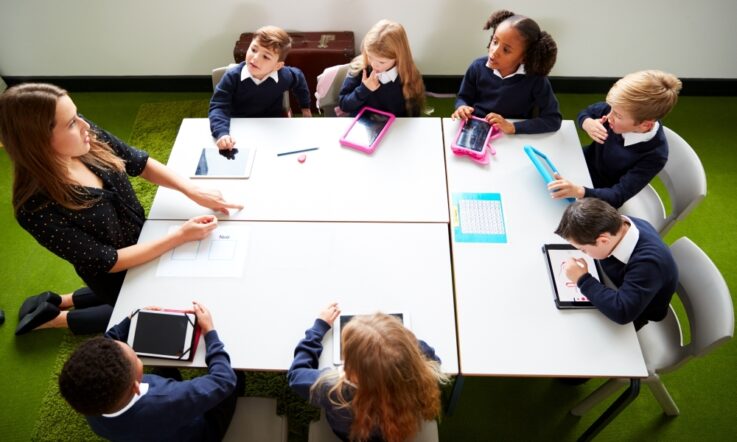This podcast from Teacher is supported by the QT Academy. Our new project, Strengthening Induction through QTR, will support 1,600 teachers with free access to Quality Teaching Rounds professional development.
Thanks for tuning in to this episode of Teacher Staffroom, where we catch you up on the latest evidence, insight, and action in education. I'm Dominique Russell.
This month, we had the pleasure of announcing the winners of the inaugural Teacher Awards. We’ve begun sharing their stories with you in articles on our website and I’ll bring you up to speed on these in this episode. We’re excited to be able to share the stories of the remaining winners with you over the coming months, so stay tuned for those.
Reading through your award submissions, it’s clear that many educators are engaging in leadership practice as part of their day-to-day work. In this episode, we’re going to bring you a range of stories we’ve published recently on the topic of leadership.
And, like all episodes of Teacher Staffroom, I’ll be sharing some other highlights from content we’ve published during the month, and I’ll also be posing some questions throughout the podcast, so feel free to pause the audio as you go, gather some colleagues, and discuss together how these stories might be relevant to your school context. Let's jump in.
As I mentioned, we’ve begun publishing the stories of the winners of the inaugural Teacher Awards. The first article we published was on the recipient of the Improving Health and Wellbeing Award. I had the pleasure of speaking with the recipient, Kate O’Donnell from GOAL College. She was nominated by her colleague in recognition of the various initiatives in place at their school, which caters for students in year 11 and 12 who are interested in sport and may be facing disadvantage and may be disengaged from mainstream school settings.
The Judging Panel was impressed by the College’s professional development opportunities, which has included a program with an experienced Aboriginal presenter when enrolment of Aboriginal students at the school increased from 2% to 10%, and the College’s yearly learning about their own policies and processes for working with at-risk students, including mandatory reporting and child safe processes, which Kate O’Donnell leads. Here’s a quote from our Judging Panel:
Kate's attention to First Nation's students and the special attention given to high-risk, self-harm students indicates a very real reality of teachers working in such spaces. The stress and emotionality of these experiences carry with them a host of unpaid labour and often underappreciated stresses.
Kate O’Donnell was also recognised for the school’s emphasis on partnering with external experts, and the parents and carers in their community.
So, that brings me to a question for you to think about. As a teacher, reflect on how you approach prioritising student health needs and their wellbeing. Does your approach include partnering with external experts from the wider community? What about the parents and carers in your school community?
The second award winner we have spoken with this month is Dr Todd Zadow from St Margaret’s Berwick Grammar in Victoria, who was named winner of the Cultivating an Inclusive and Positive Culture Award. This award category celebrates the efforts of an individual in cultivating an inclusive and positive school culture, which can promote learning outcomes and wellbeing.
Todd is the Science Learning Leader and Learning Analytics Coordinator and was nominated for the award by his school principal who shared how many of the programs and clubs that Todd has formed have led to increased student engagement. You can read the full article at our website to find out more about Todd’s story, but for now, here’s a quote from our Judging Panel on his submission:
This submission details the extent to which a single education professional has gone beyond the position description and created opportunities for students that will benefit long after the programs, engagements and experiences this teacher has created and led. The depth and careful thought that has gone into developing experiences for students is impressive.
So, here’s a question for you to think about on this topic. How do you ensure that your classroom is a safe, inclusive and respectful learning environment for all students? How do you know? Is this something you ask for feedback on?
Coming up, we’ll share more stories on our topic of leadership. But first here’s a quick message from our sponsor.
You’re listening to a podcast from Teacher Magazine, supported by the QT Academy. ‘Strengthening Induction through QTR’ is a new project supported by the Australian Government that will provide 1,600 beginning and experienced teachers free access to QTR professional development. Evidence shows QTR improves teaching quality, teacher morale, and student academic achievement. The Strengthening Induction project will support beginning teachers through participation in QTR and aims to boost their morale, confidence, job satisfaction, and improve retention rates.
Staying on the topic of leadership, if you’re subscribed to our podcast feed you’ll know we have started season 2 of our School Assembly podcast. School Assembly is the series that explores what it takes to build a brand-new school from the ground up. We’ve just published the second episode in this new season, where we’re following Jo Camozzato, principal of the new Bemin Secondary College in the Melbourne suburb of Truganina.
It's a dual campus school that’s opening at the beginning of next year, so Jo is certainly well underway with her journey. In this most recent episode, Jo spoke about all things planning. She’s currently in the middle of planning what the curriculum program will look like for year 10 while also continuing work on the elements of the year 7 curriculum, and in this episode, she shares some short-term and long-term planning activities and how she’s keeping on top of everything during such a busy time.
One thing I’d like to share with you here from the episode is Jo’s reflection on the importance of being flexible and adaptable in planning as a leader, rather than being fixated on making sure something’s finished so you can tick it off a list. Here’s what she had to say:
… Some things you can tick off, you can say ‘Okay, we’ve got the school logo – done; we’ve chosen what kind of uniform design and what that’s going to look like – done.’ But other things are forever developing, they don’t finish. You have to be comfortable with the fact that some things are not finished – and won’t be finished when you open, and will not be finished for ever, really – are just always evolving and developing, and you’re incorporating new ideas and reviewing and evaluating based on the new staff that you have, but most importantly based on the student cohorts you’re getting and what the kids actually need. So, you never tick those things off.
Staying with podcasts for now, and in our latest episode in our Research Files series, I spoke with Dr Catherine Smith from the University of Melbourne about a new body of research, of which she was the lead investigator, that involved surveys of young people with disability and their parents on their experiences in school settings.
The survey responses show that 29% of children in early childhood education and care settings and 70% of young people in school settings report being excluded from events and activities at school. As well as this, 28% in early childhood education and care settings and 65% in school settings reported experiencing bullying.
In this episode, I asked Catherine what she recommends school leaders can do to begin to address the problem of bullying in their school settings. Here’s a snippet of what she had to say:
There's a lot of pressure and a lot of attrition from teaching and a lot of that has to do with things just being a little too hard. And we're not talking about easy work here. We're talking about work that needs to be supported. And we have a tonne of really important expertise in advocacy communities and also in specialist schools. In special schools, those teachers have real expertise and real training around these things. If we can bring those teachers into partnership with local schools, there's so much we could do with the information there and we bring those voices in from the disability community and the other communities that require those sorts of representation within a school. And we think about it in terms of a whole school community. Those context specific adaptations we can make will be able to make a real difference.
That brings me to another question for you to reflect on. As a school leader, think about the training and support you provide to staff in the area of supporting students with disability. Are people living with disability directly involved in this process? If not, how could you ensure this is a key element of future training opportunities?
And finally, a final piece of leadership content I’d like to highlight with you in this episode is the story of how Trinity College in South Australia has a partnership with the University of South Australia that focuses on embedding research- and evidence-informed practice.
It’s an interesting discussion on how they’ve recently been working on building the capacity of emerging leaders. The College has 4 campuses and in the article, they describe how they take an adaptive leadership approach at the local level. Here’s what they had to say in the article:
What that means in real terms is that one school [is] really invested in a Visible Wellbeing approach … At another school, they might have a focus on creativity… So, it will look different for each of the schools, but there's a common approach, common supports and it is heading in a common direction, but there is enough responsiveness for those local leaders to make it their own.
That quote there brings me to a final question for you for this episode. As a leader, what are the internal and external contextual factors that impact improvement approaches at your own school? How does this affect your leadership approach?
That's all for this episode. You’re now all caught up on the latest evidence, insight and action. Links to all the content and the resources I’ve mentioned will be in the transcript of this podcast available over at our website, teachermagazine.com.
Subscribe to our podcast channel wherever you get your podcasts from, so you can be notified of any new episodes as soon as they land. And, while you’re there, we’d love if you could rate and review us.
This podcast from Teacher is supported by the QT Academy. Find out more about accessing free Quality Teaching Rounds professional development to support beginning teacher induction at qtacademy.edu.au.



